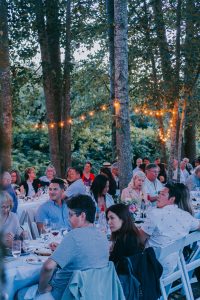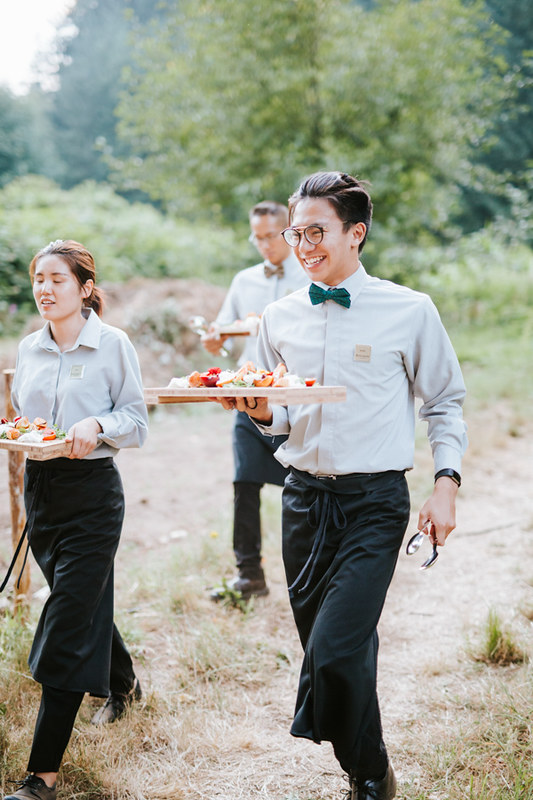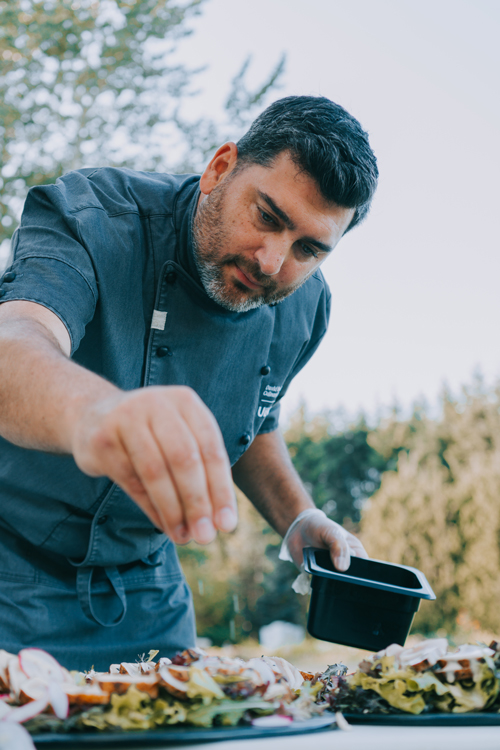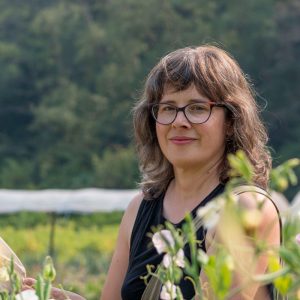UBC Farm Long Table Dinner
An enchanted evening in the poplar grove
For one night only, join Executive Chef David Speight and the exceptional Sage Catering team at this magical farm to table dinner — right here at the UBC Farm.
July 24, 2025
5:30-9:00 p.m. (Farm tour included)
$250
SOLD OUT! Sign up for the Waitlist
Want advance tickets?
Become a Member of the UBC Farm!
This event sells out in minutes. To ensure you get tickets next year for this highly coveted event, become a member! Hedgerow members get first advanced presale access, then Orchard and Farm Gate, and then the presale goes to our waitlist. Last year we sold out before we even got to our newsletter subscribers, so don’t delay!

About the Long Table Dinner
Following the wildly successful events of previous years, the UBC Farm Long Table Dinner returns with an enchanting multi-course, family-style meal featuring the exquisite organic produce grown at the UBC Farm.
Enjoy a warm summer evening under twinkling lights at long tables set between rows of trees in the poplar grove, while our team treats you to a full-service menu celebrating the seasonal bounty of UBC Farm and local food producers.
Tickets include dinner, one beverage and canapés on arrival. We will have a cashless bar open with selections of local wine and beer. Menu may change before the event to maximize in-season ingredients. A Farm Tour (optional) will take place before dinner.

You may notice that our ticket price has increased more this year than in previous years. This reflects an increase in the cost of food and equipment and ensures that employees are paid a fair wage. All net proceeds, after covering expenses, will go directly to supporting the Centre for Sustainable Food Systems at the UBC Farm through our experiential learning programs, research, and sustainable food cultivation. We sincerely appreciate your support!
This event is proudly brought to you by the Centre for Sustainable Food Systems at UBC Farm, Sage Catering, and UBC Food Services.
About the UBC Farm
The UBC Farm is the Centre for Sustainable Food System’s main research, teaching and learning space, located on the traditional, ancestral, and unceded territory of the hən̓q̓əmin̓əm̓-speaking xʷməθkʷəy̓əm (Musqueam) people. Situated within a 90-year-old coastal hemlock forest, the 24-hectare UBC Farm was started by students in 2001 and since then the integrated organic farm and forest ecosystem has become a key site of agroecological research and education as well as an important Vancouver food hub.
The UBC Farm is certified organic and features annual crop fields, perennial hedgerows and orchards, Indigenous-led gardens, and forest stands. We cultivate over 200 varieties of fruits, vegetables, and herbs.

David Speight, UBC Culinary Director and Executive Chef
About the Chef
David Speight is a homegrown Vancouver talent who has been cooking professionally for the past twenty-five years. He is a graduate of culinary programs both locally at Vancouver Community College as well as from the Culinary Institute of America in New York.
In Chef Speight’s current position as Executive Chef & Culinary Director at the University of British Columbia David has been a key leader in inspiring his colleagues, students, and faculty to join him in addressing health, wellbeing and sustainability issues through the need and love of food. David was the 2018 recipient of the UBC President’s staff award for Leadership and continues to lead UBC towards a more sustainable food system.

Key Details
Event is Weather-Dependent
In a true long table dinner style, we will not be covering the event with a tent. If rain is forecasted on the Farm, we will cancel at least three days in advance and offer a full refund.
Refund and Transfer Policy
Tickets cannot be refunded but can be transferred. Please email us to transfer your tickets to another name. Please note there is a limit of 6 tickets per transaction. American Express is not accepted at this time.
Dietary Options
Dinner will be served family style. Vegetarian and gluten-free options will be incorporated with all courses. Preview last year’s menu here. This year’s menu will be published shortly before the event and may also change in order to maximize in-season ingredients.
How to get to the UBC Farm
Please view Transit & Parking Details here.
Visiting Guidelines
We ask all UBC Farm visitors to respect and enjoy the space, and to not disturb any plants, equipment, or research apparatus on site. Please watch your footing and stay on the roads or grass pathways. Please leave your pets at home.











